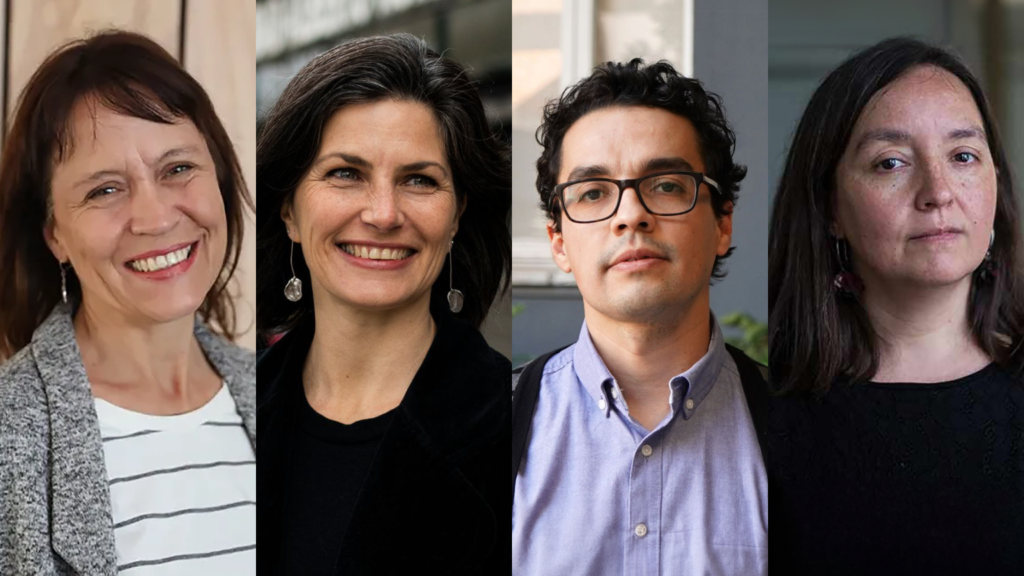On August 20, the results of the 2024 Millennium Nucleus Social Sciences Competition were announced: 9 projects were awarded funding out of 77 submissions. Three of the selected proposals were led by four researchers from the Department of Sociology at Universidad Alberto Hurtado.
Oriana Bernasconi, Julieta Palma, Camilo Sembler and Alejandra Luneke presented projects that address topics such as human rights and political violence; transformations in family and collective life; security and crime; and climate change.
The aim of this public competition is to support research that contributes to the country’s comprehensive development in its respective areas, while advancing frontier knowledge with regional and global impact. The evaluation criteria include scientific merit, quality of the research proposal, and its potential to make an international impact in the respective field.
The recognition of UAH’s Faculty of Social Sciences highlights the academic community’s commitment to the public good and the high quality of its research trajectories.
Millennium Nucleus for research on Human Rights violations Data production and use by the State (DATA JUSTA) is led by academic Oriana Bernasconi and aims to advance interdisciplinary scientific knowledge and improve data systems and policies on human rights violations in accordance with international standards.
“In today’s era of widespread violence, human rights violations manifest in wars, dictatorships, and the slow oppression of entire communities,” states the project document. It adds, “knowledge production is crucial to address these violations and to foster understanding. Access to information is essential for justice and truth, to counter the denial by perpetrators, to provide redress and reparations to victims, and to sustain memory practices that enable social learning and promote the non-repetition of such atrocities.”
DATA JUSTA transcends disciplinary boundaries, exploring the intersection of human rights, critical data studies, and science and technology studies. The research brings together six universities and various disciplines, including sociology, law, criminology, psychology, communications, and data science.
Julieta Palma and Camilo Sembler are part of the same team as deputy director and principal investigator, respectively, in the Millennium Nucleus on Labor Policy and Family and Collective Life (LABOFAM).The project also includes scholars from multiple disciplines—sociology, anthropology, economics, and law—and universities that have previously collaborated on several research initiatives.
LABOFAM aims to study how policies implemented to reconcile work, family, and personal life produce changes in labor relations (e.g., job satisfaction and workers’ willingness to join unions) and in the family life of workers (that is, in the practices and strategies used to care for dependents such as children and the elderly), according to the project summary.
Finally, Alejandra Luneke is the principal investigator of the Millennium Nucleus on Criminal Complexity: Emerging Forms of Criminal Complexity, Scope, and State Challenges in a Changing Social Context. as principal researcher. The Nucleus seeks to examine and understand the causes and scope of the increasing complexity of crime in Chile and its impact on the State’s capacity and institutions—not only by analyzing its social, institutional, and political implications, but also by proposing a culturally relevant theoretical framework.
Professor Luneke explains that the proposal “is based on the changes that Chile’s criminal landscape has undergone in recent years, which pose serious challenges to the State and public responses. We argue that these new forms of crime demand both theoretical and empirical reflection on the concept of Organized Crime, grounded in cutting-edge, interdisciplinary research that generates empirical, territorially situated knowledge.”
The research team is interdisciplinary and co-led by Catalina Droppelmann from Pontificia Universidad Católica de Chile (Santiago) and Romina Ramos from Universidad Arturo Prat (Iquique). The principal researchers includes: Mauricio Duce (Lawyer, PUC), Pablo Carvacho (Lawyer, PUC), Patricio Domínguez (Engineer, PUV), Carlos Díaz (Economist, UAH), Ángel Aedo (Anthropologist, PUC), and Alejandra Luneke (Sociologist, UAH).

